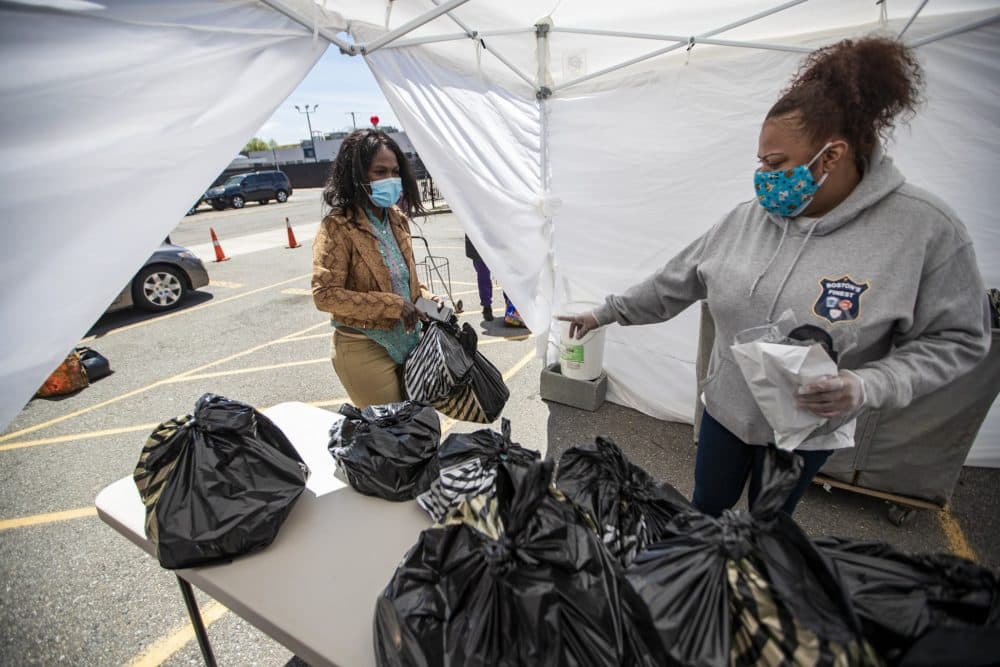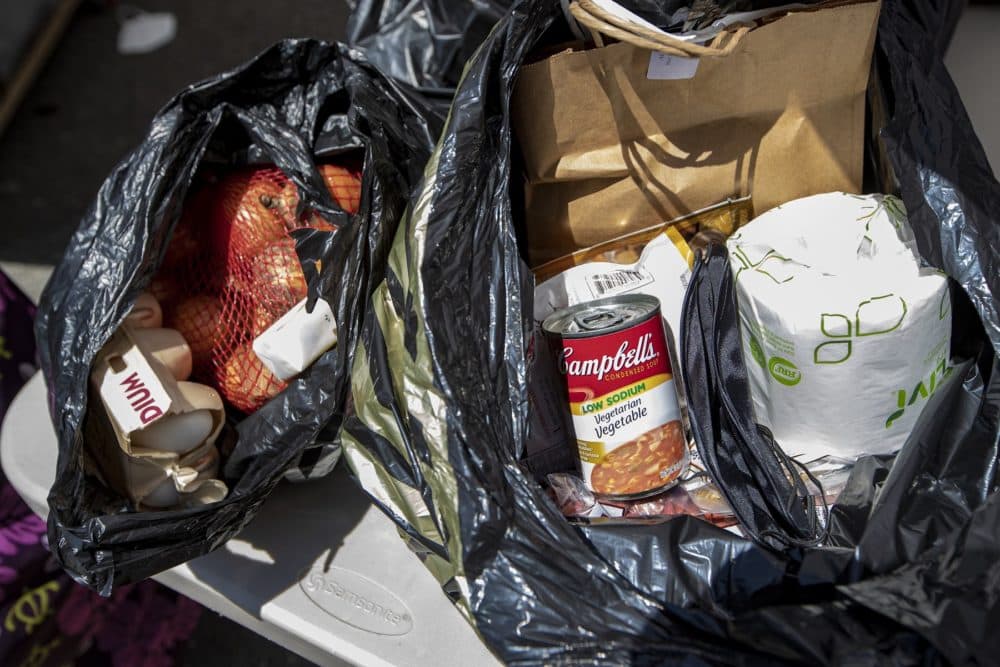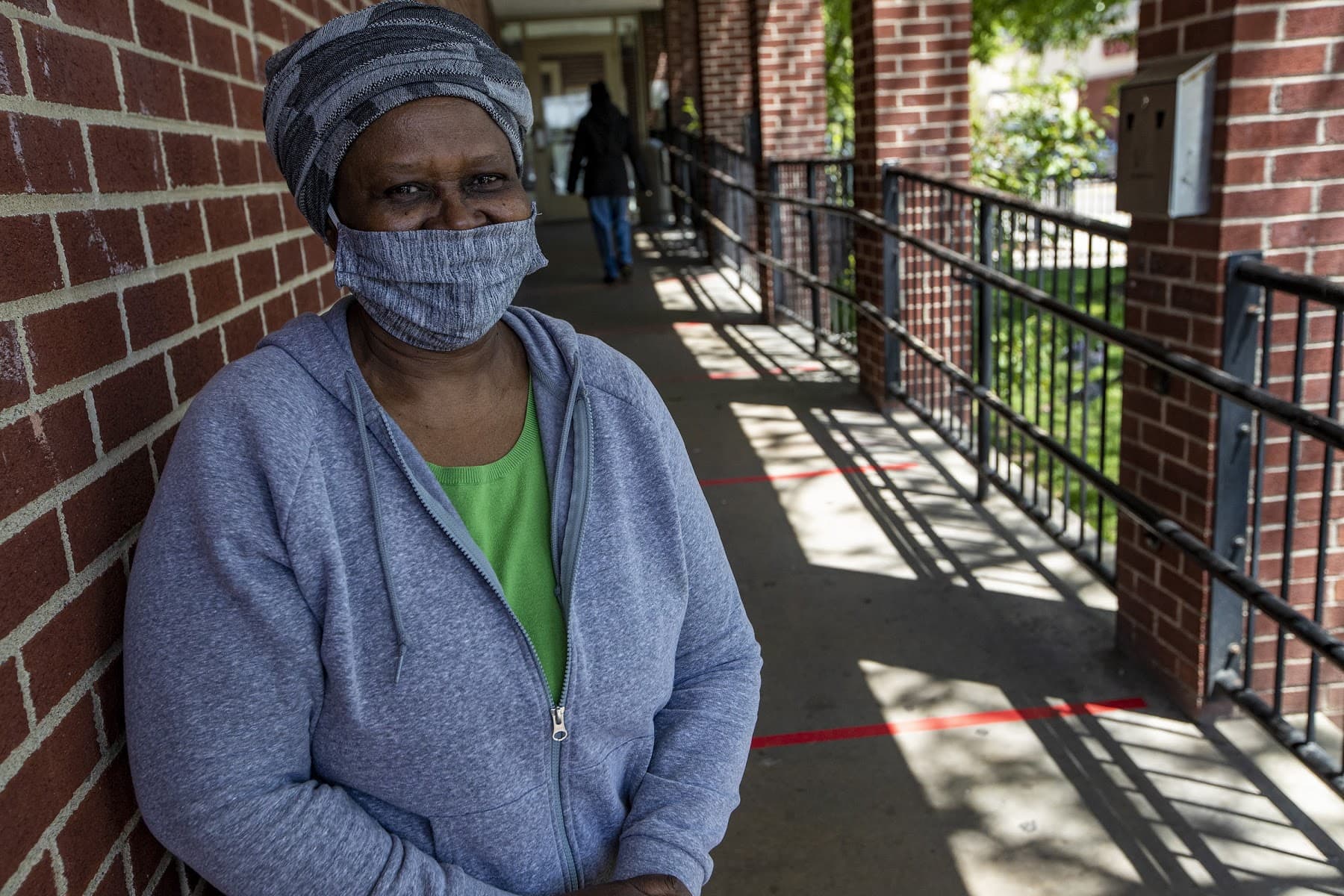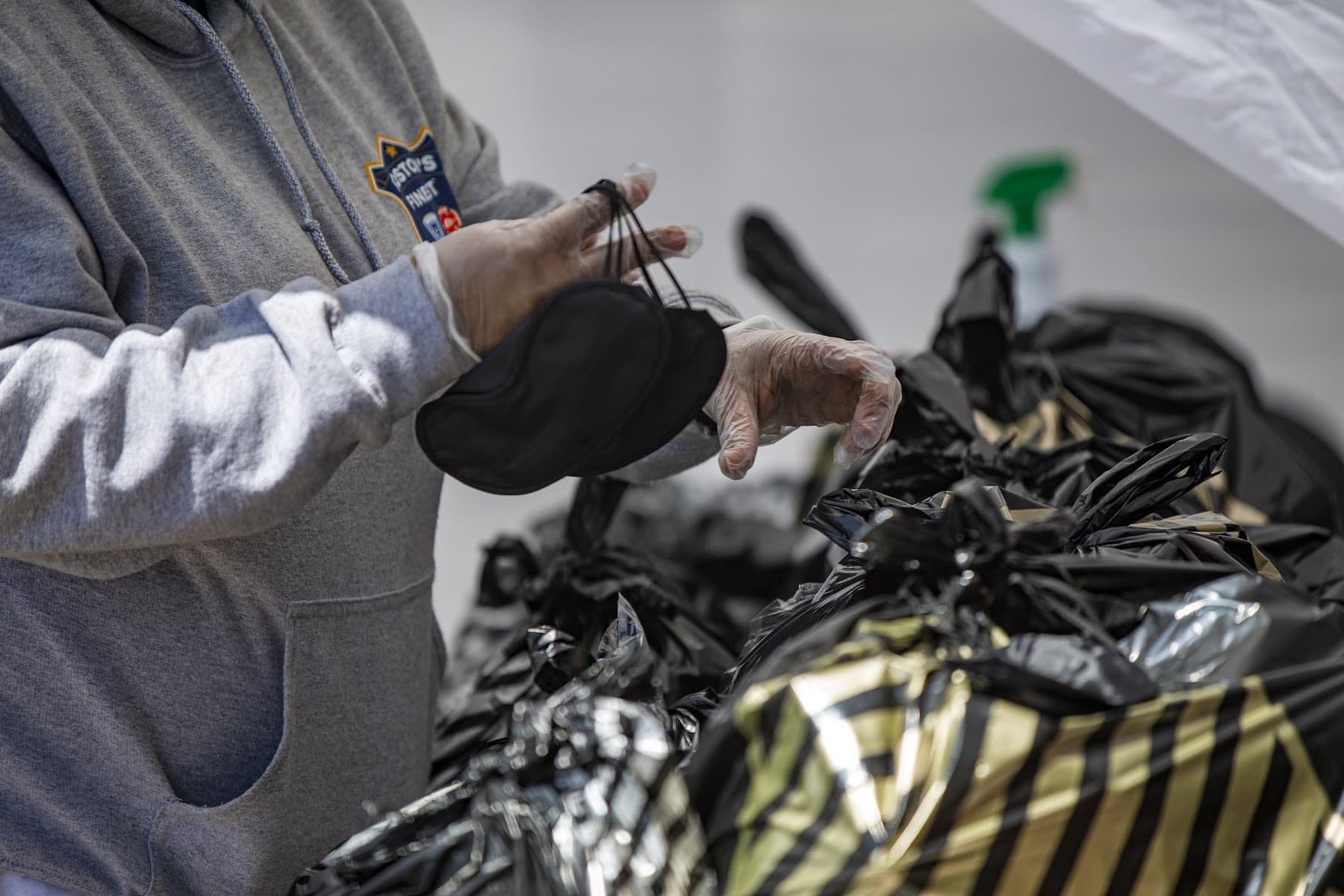Advertisement
'Already Living On The Edge': Women Served By Rosie's Place Deal With Even Shakier Reality In Pandemic

Every weekday it goes on for hours. Women — and more women — line up for bags of groceries outside Rosie's Place, the shelter and community center in Boston's South End.
The center's food pantry is now in a tent, rather than two rooms inside. A Rosie's Place employee asks each woman how many people live in her household, and gives her a bag of perishable food, a bag of non-perishables, toilet paper and face masks.
The women lining up here have homes but face hunger. They're not allowed to go inside Rosie's Place for a meal or anything else right now. Indoors is reserved for women who are homeless, to keep the number of people in the building down. So the women coming to the pantry have to just grab their bags and go.

"We started out with making 120 bags a day," explains Leemarie Mosca, president and executive director of Rosie's Place. "And then it grew to 150 bags a day. And then it went to 200 bags a day. And the other day we did 270."
The organization has long offered meals, stabilization services and classes. Now, the coronavirus pandemic has led to a different way of life at Rosie's Place, as well as for the women it serves.
"These [are] women who were already living on the edge," Mosca says of the clients coming to the food pantry. "They were already food insecure. They were already housing insecure. They were already unemployed or underemployed, many of them."
The pandemic is putting them on even shakier ground. Some have lost jobs. Others can't work because they don't have child care. And some have lost out in other ways.
'I Felt So Sad. I Cried Every Day'
"When this thing started, it was like it was the end of my life," says Lucy, a Rosie's Place client. "I felt so sad. I cried every day in my house."
Lucy says she was feeling lonely and isolated because she couldn't spend time at Rosie's Place. She lives in an SRO — or single room occupancy — building. The 64-year-old fled her native Cameroon 13 years ago because of repeated sexual assault, she says. Lucy doesn't want us to use her last name because she came to the U.S. without proper documentation and says if she were deported, she'd fear for her safety because of Cameroon's violent unrest.

Lucy was homeless when she first came to Boston. Advocates at Rosie's Place helped her find housing. She's taken classes including English, sewing, jewelry making and creative writing there — and, she says, it's where all of her friends are.
"Rosie's Place made me to be a very strong woman," she says.
Once the reality of the pandemic settled in, Lucy says, the skills she had picked up at the shelter and community center led to an inspiration: "Make masks and give it to people, because they said everybody should wear a mask."
She got busy on her sewing machine. "And I start cutting pieces ... I sew them and they became masks," Lucy says. "I carry them everywhere to give to anybody that don't have a mask."
She also started using the writing skills she was taught to chronicle her experiences in poetry and other forms. It's all keeping her going.
For women who are homeless and stay inside Rosie's Place for overnight shelter or daytime services, there's also a certain level of isolation.
Advertisement
In the dining room — after they wash up at portable hand washing stations — they sit one woman to a table, rather than the normal eight.
Food is offered all day, instead of just at certain hours. That's both to make sure people are eating and to make sure large groups don't surge into the facility at meal times.
'So Far Behind Because Of The Pandemic'
The overnight shelter houses 20 women. Normally, they're allowed to stay for three weeks. But Rosie's Place has kept the same 20 women since March, for safety. And they're required to stay on the property, unless they have a job.
"It's been very stressful for me," says Andie, one of the shelter guests. She's says she's tested negative for the coronavirus twice — the second time at Rosie's Place in April. Everyone staying in the overnight shelter tested negative, according to shelter leaders.
But Andie is still concerned that women who leave for work could get exposed and bring the virus back. She has good reason to worry, she says: she's been in and out of the hospital since September, sick with pneumonia and the bacterial infection MRSA, and has developed a chronic lung disease as a result.
Andie was just about to return to her job driving for an airport car delivery service when the pandemic hit. She was laid off.
The 55-year-old now spends her days reading and playing games on her phone — often in the room she shares with two other women. Their time in the shelter's common area is scheduled, so it doesn't get crowded. They can go out in the garden for some fresh air after the day shelter closes.
Andie asked us not to use her last name because she's worried she could face discrimination in her search for an apartment.
"My goal is to get housing, but ... I think it's just going to be so far behind because of the pandemic," she says, adding that she's applied for more than 200 apartments in the Boston area since last fall but has heard nothing back.
Mosca says that for the women Rosie's Place serves, the pandemic initially seemed like just one more disappointment and burden in a long string of them. Women seemed resigned to the situation.
But now, she says, those women are exhausted and feeling the mental toll of the crisis. They're looking for any way not to catch the coronavirus, she says, and desperate for ways out of the shelter.
"So we're seeing more and more women sleeping outside and choosing to put themselves in some other unsafe situations, but ones that are not necessarily, that they think, COVID-unsafe," Mosca explains, adding that sleeping outside brings increased risk of sexual assault and other dangers.
She says her clients are left to decide between two bad options. When a woman makes the choice to sleep outside, Mosca says all she can do is tell her she hopes she'll be safe — and that she'll be back at Rosie's Place the next day.

This segment aired on June 4, 2020.
